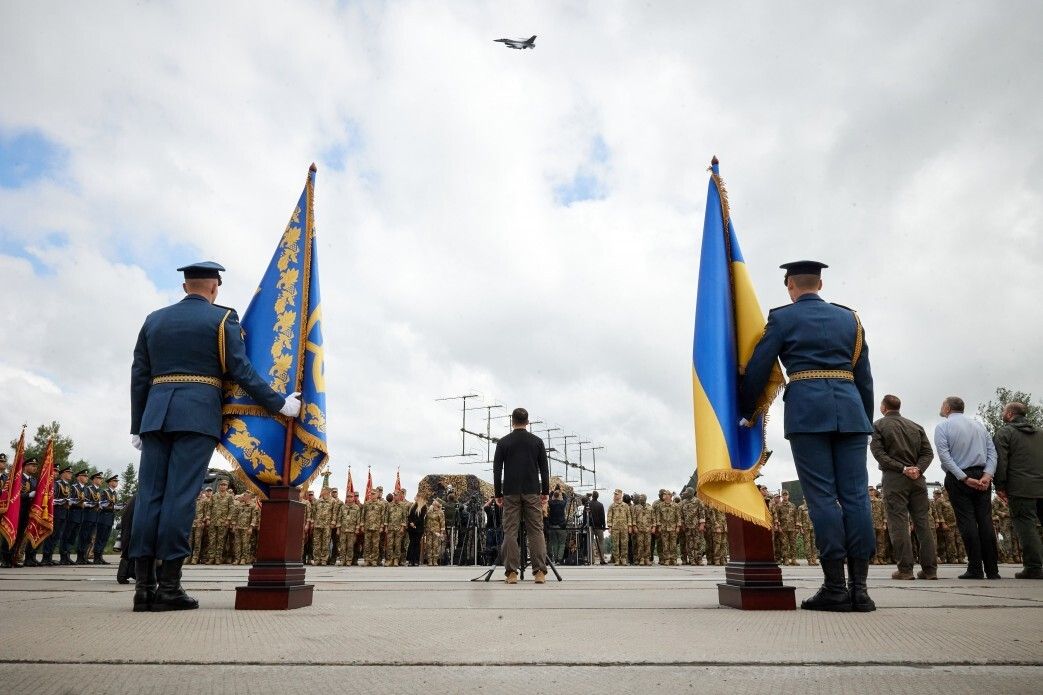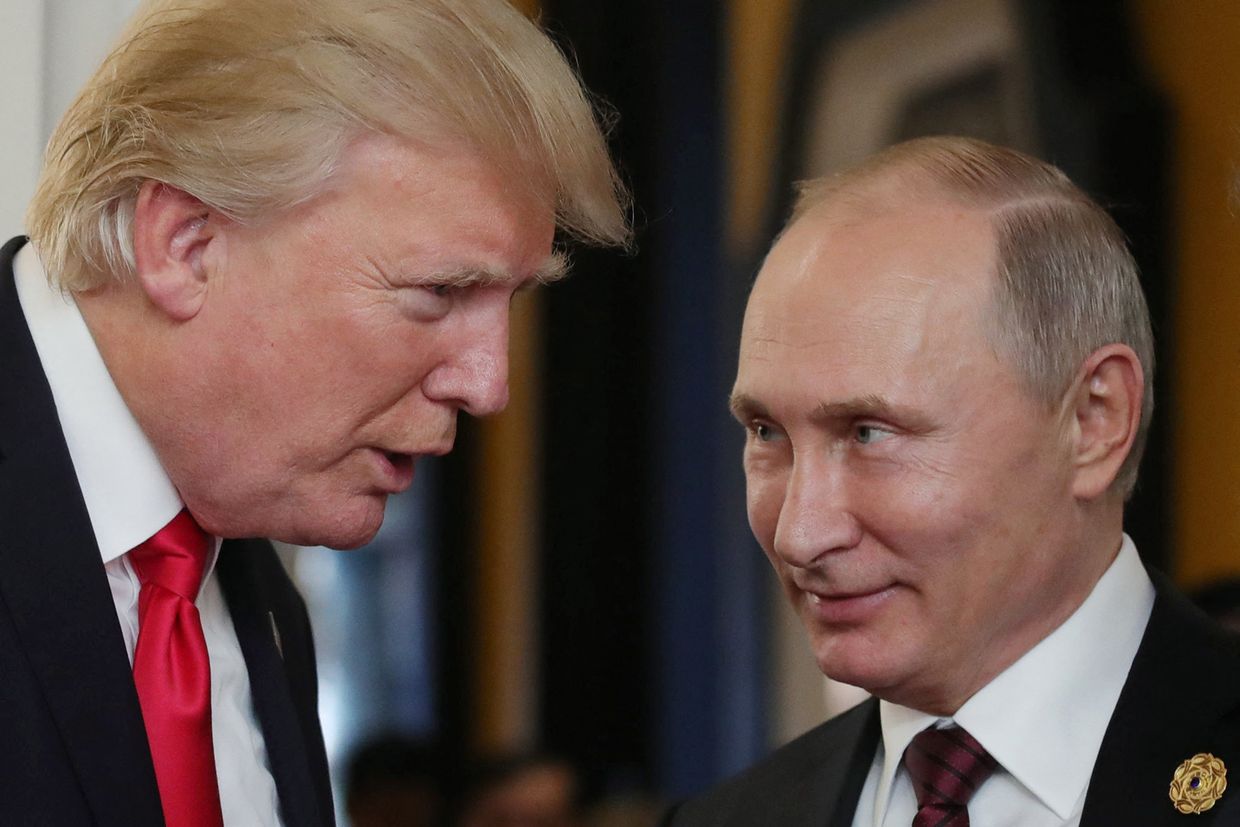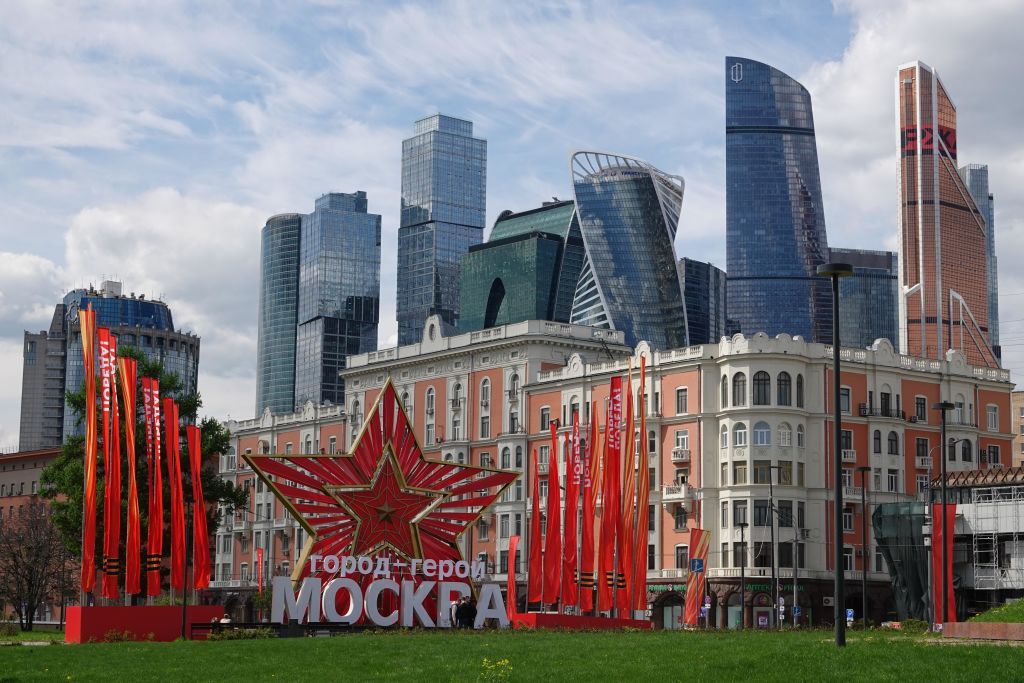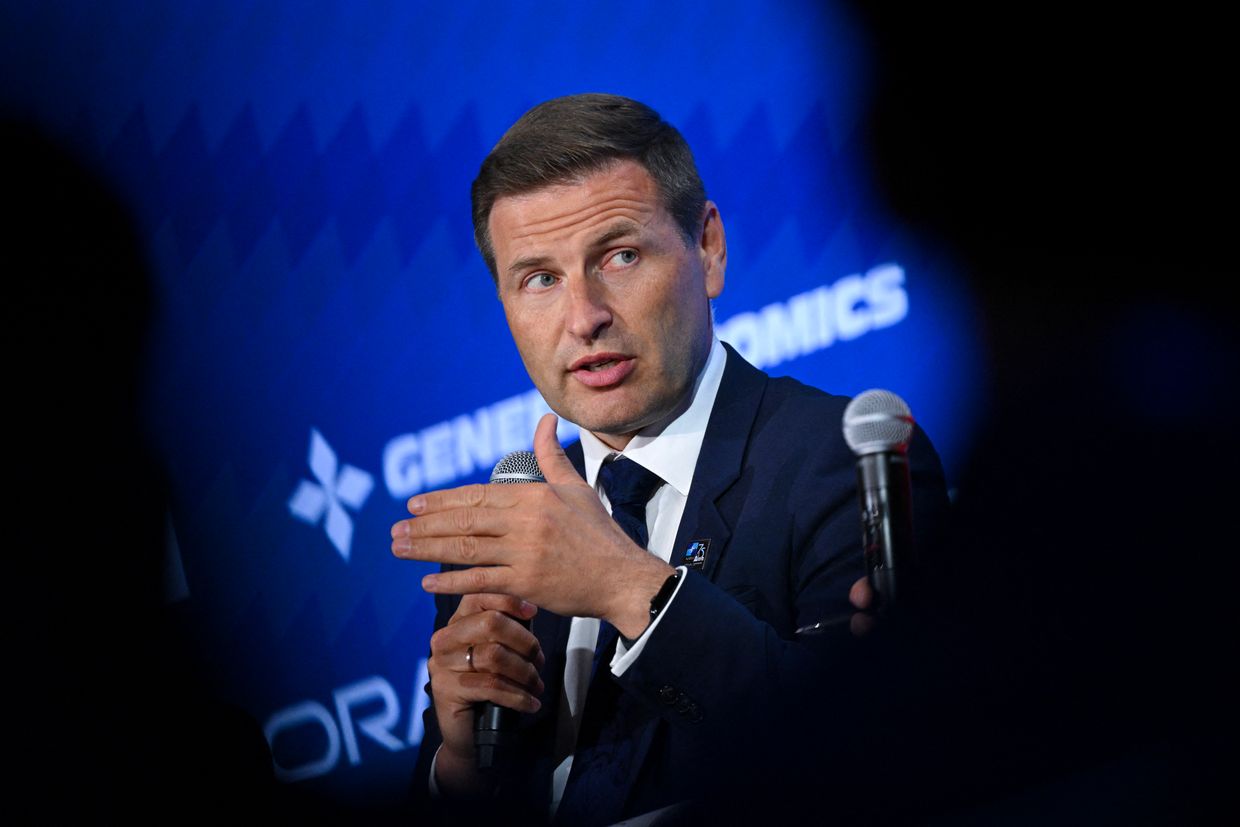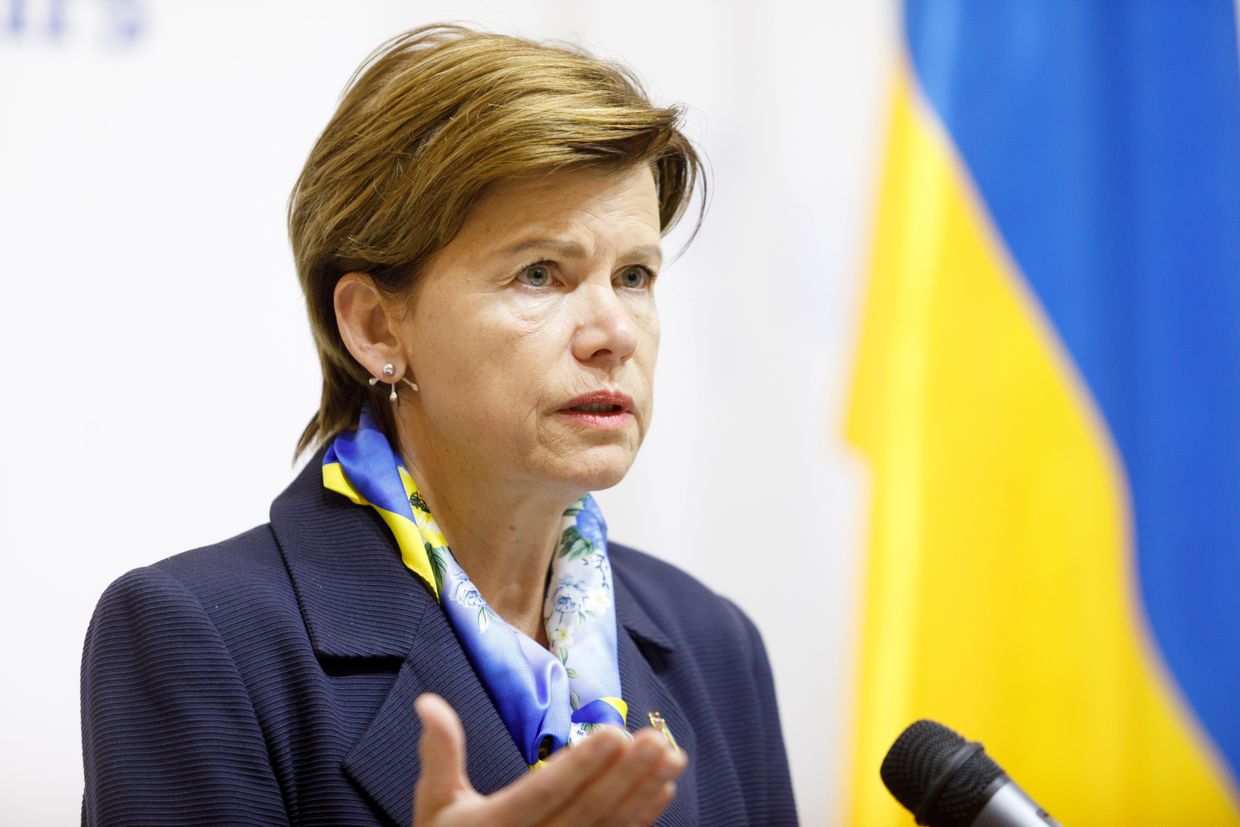‘A push for Ukraine’s capitulation’ – Baltic, Eastern Europe react to Trump’s rush to negotiate peace with Putin
For Central-Eastern European nations and the Baltic states that have been staunch supporters of Ukraine, Trump’s sudden push for peace talks with Putin is highly alarming.

Ukrainian President Volodymyr Zelensky listens during a joint press conference with Danish Prime Minister Mette Frederiksen in Kyiv on Sept. 6, 2023. (Yan Dobronosov / Global Images Ukraine / Getty Images)
Editor's note: The article was updated on Feb. 14 to include the Latvian Foreign Ministry's comments.
European nations, particularly Ukraine’s neighbors and the Baltic states, were stunned when the U.S. President Donald Trump suddenly announced the start of peace negotiations with Russian President Vladimir Putin to end the war in Ukraine.
"We have agreed to have our respective teams start negotiations immediately, and we will begin by calling President Volodymyr Zelensky, of Ukraine, to inform him of the conversation, something which I will be doing right now,” Trump said on Feb. 12 after a phone call with Putin.
Trump’s sudden announcement comes as his team continues to undermine Ukraine’s potential leverage at the negotiating table – such as the NATO membership aspiration and the demand to return to 1991 borders – before the talks have even begun.
It also comes as Russia retains the initiative in multiple sectors of the front line, forcing the Ukrainian troops to withdraw from one settlement after another amid a critical manpower shortage.
With the new White House administration pushing to quickly end the war, now nearly in its fourth year, Kyiv has demanded that it takes part in any talks concerning Ukraine.
For Central-Eastern European nations and the Baltic states that have been staunch supporters of Ukraine, Trump’s sudden push for peace talks is highly alarming. Calling for Ukraine and Europe to be involved in the process, they stressed that the best way to ensure European security is by pumping more military aid into Ukraine and strengthening its positions.

World leaders will meet at the annual Munich Security Conference on Feb. 14, where the war in Ukraine will be at the top of the agenda.
The Kyiv Independent spoke to officials and experts from central eastern Europe and the Baltics to present their views on Trump’s negotiation drive to end the war at any costs. The comments have been edited for clarity.
Gabrielius Landsbergis
Lithuania's former foreign minister (2020-2024)
The main question that I think that needs to be answered now is: is there leadership enough in Europe to take over what the U.S. left yesterday? The questions that need to be answered: Is Europe able to offer real security guarantees to Ukraine? Is Europe able to resist agreeing to an agreement between Putin and Trump that would leave Ukrainian territories under (Russian) occupation. And it will probably be the most important hour for Europe, because if Europe is unable, then it's a battle lost. Then it's Putin's victory. It's a very dark hour for Europe.
What we heard yesterday from President Trump is that they are determined to have peace talks, even the talks that might probably not even involve Ukraine, which is completely beyond the realm of understanding. But this might just happen. And then it boils down to what Ukraine is doing, to what Europe is doing, and to what separate countries are doing. So I hope that even if Europe is unable to stand for what's right and offer its strength behind Ukraine, well, maybe then you will have a group of like-minded countries that would at least try and do that.
I'm not very optimistic about (Europe’s ability to offer what the U.S. can’t). It would depend on the leadership (of European nations) because it requires very difficult decisions. And we've been stuck in the past trying to figure out even way more simple equations – we are unable to do that. But I hope, seeing from the public space, there are a lot of people who do understand what's at stake. They do understand that it's not just the Ukrainian future at stake, but it could very well be a European future at stake.

We have been asking, so that, for example, at least a representative of Nordic and Baltic countries would be present in any sort of talks. Because the Nordics and Baltics, we assisted Ukraine more than Germany – several times more than Poland. I think it would be understandable if at least one representative from the northern region would also be present. Because if Ukraine is unable to win, the next step – and President Zelensky has said this – we are in danger. Our region is in danger. So it's our future that is being decided in those talks as well.
I think that everybody was surprised yesterday to find out that the talks are already happening, that the summit is being organized, that Ukraine is not being involved. Europe is at least three steps behind.
"Peace talks would need to begin at the battlefield, with Ukraine having a stronger hand."
We (in Europe) are already divided, and it's just the first steps. And it's not just about who's at the table, it's what we bring to that table. What kind of leverage? Can Europe realistically offer troops to Ukraine? Can we realistically offer security guarantees, weapons? Can we really do that? If not, then even sitting at the table would not make any difference.
From my perspective, it is potentially the biggest crisis for Europe since World War II. People do say that Europe is forged in crisis, that it becomes stronger or it breaks down. So this is yet to be determined.
I really don't think (that Putin would seriously consider any peace talks). Putin might try to convince Trump that he is eager to negotiate, but at the same time, he will be doing everything he wants or can.
Peace talks would need to begin at the battlefield, with Ukraine having a stronger hand, where Ukraine would be able to actually start pushing and increasing pressure on Russians. This is how some success at the negotiating table could be achieved. Now, Ukraine is not put in a stronger position, so basically, what happened yesterday is a push for capitulation of Ukraine.
(But some countries have not understood this), and this is where my pessimism comes from, because we had the chance. Ukraine gave us the time to do what's right. And we didn't do it. So it is difficult for me to expect now that we will change the way that we operate.
Sandis Sraders
Researcher, Latvian Institute of International Affairs board member, Latvian Transatlantic Organization
“No action, only talk and tweet” — this is European security cooperation. Three decades after the Cold War’s end, the U.S.’ annual defense budget stands at $970 billion, while Europe spends only half that amount. This is the European security approach, despite Russia’s ongoing war against Ukraine for the past 10 years, its continued occupation of Georgian territory, and its persistent meddling in Western democratic processes, including the U.S.
It is hardly surprising that the U.S. continues to lead security talks with Russia, even when the security of Ukraine and Europe is at stake. This is the direct outcome of Europe’s heavy emphasis on harsh words, followed by light or no action at all. However, past transatlantic discord has often catalyzed stronger European cooperation.
To sustain any form of security architecture or a rules-based international order, Europe must act now — arming Ukraine before any potential Trump-Putin deal reshapes the balance of power. Security is very practical – you have it or not. The ball is on Europe’s turf.
Annely Kolk
Estonia’s ambassador to Ukraine
Estonian position has, of course, not changed. We have always stated that before any negotiations, Ukraine must be strengthened because Putin understands only strength.
Europe, its allies, the West – we all have the means to actually corner Russia. We can use sanctions, sanction Russia’s shadow fleet, use frozen assets, not only the profits of the frozen assets, but the assets themselves. They have to show Putin that time is not on his side. It's the opposite. Russia’s economy is collapsing, and Europe really must strengthen the military aid to Ukraine, political help, everything.

Ukraine has to start from a really strong position, and rushing into any negotiations right now without giving Ukraine security guarantees is not right. It's not timely. And we don't see any signs from Putin's side to change their goals. And we don't think that Putin will change (Russia's) goals during the possible negotiations. We haven't strengthened, to be honest, Ukraine within these three years enough. (To sufficiently strengthen Ukraine, Europe) needs political will.
In my opinion, of course, Putin would be ready for any negotiations, but it doesn't mean that he is sincere or that he will keep his promises. We have seen over the history that Russia has always violated all the agreements that Russia has been part of. Anything that Putin is saying or promising – high doubts on all of that. He only understands the language of strength, and this is the moment now that we really need to strengthen up our military and help Ukraine. So Ukraine can be the one who can demand returning to 1991 borders and reparations and all this.
If it's about Europe, I think all Europeans have to have a seat at the table. We also have European Union institutions who can represent the EU. But there are other countries from Europe who are not part of the EU. But I have all the confidence in President Zelensky's words that he will also be doing the negotiations with Europe.
Lukasz Adamski
Political analyst and deputy director of Polish public institution Mieroszewski Center
I'm not surprised that peace negotiations have begun. I was surprised at the way the U.S. diplomacy is conducting this negotiation. They are not going to accept Ukraine into NATO or insist on Ukraine’s full territorial integrity. They are going to visit Putin in Moscow or invite Putin to Washington. I don't know the details, but it's not the way we should handle war with Russia.
"There is a possibility that Trump's politics would lead to a major war between European nations and Russia."
The picture is emerging that Trump is trying to handle a certain deal with Putin, reckoning on the short-term gains and presence in Ukraine of American enterprises and perhaps also if he is interested in exploring Ukrainian mineral resources. But Trump has no vision of how to ensure this peace, how to make this peace durable, and trust for Ukraine.
The future of Europe depends on the ability of European society and European nations to mobilize themselves to spend more on defense. If we fail to do it, unfortunately, within the last three years, there were only several countries that drew conclusions from the war.
There is a possibility that Trump's politics would lead to a major war between European nations and Russia. I don't know whether it would happen because, as I said, it depends on the ability of European nations to mobilize themselves and spend more on defense. It also depends on Putin himself and the economic condition of the Russian regime.
Urmas Reinsalu
Estonia's former foreign minister (2022-2023), defense minister (2012-2014), justice minister (2015-2019)
I have to admit, unfortunately, that the launch of these negotiations is not promising. Europe needs to define immediately its position regarding negotiations, also assuring that representatives of the free European continent are around the table and together with Ukraine, which is a victim state.
(And also define) that we will not let these negotiations result in a certain Minsk 3 outcome. To avoid that, Europe also needs to reflect back on yesterday's remarks from the U.S. administration.

First, if we are seeking a sustainable security architecture of Europe, then that requires a NATO membership for Ukraine. Secondly, if we are speaking about possible security measures for Ukraine, then that ought to be in the sake of transatlantic security perspective, (which) also (includes) U.S. troops. And thirdly, Europe needs to show determination, not rhetorically, not verbally, but in practice. We should not over-panic (about the possibility of the war in Ukraine spilling over). NATO is a functional alliance, and it remains that way.
Wojciech Przybylski
Editor-in-chief and political analyst heading Warsaw-based think tank Visegrad Insight's policy analysis on European affairs
There is vocal opposition, like Donald Tusk, prime minister of Poland, who called on the U.S. to work together with the EU on the peace plan and emphasize just peace, which represents a perspective on keeping the territorial integrity of Ukraine.
You may expect that the Baltic leaders share identical mindsets and would solely support this approach. However, Robert Fico of Slovakia expressed full endorsement of the potential appeasement while simultaneously taking a swing at the EU and Ukraine in a Facebook comment featuring a recent photo of himself with (Vladimir) Putin. A very similar position can be anticipated from Hungary, where the Foreign Ministry has backed Trump's efforts, and Viktor Orban is likely to embrace a Trump-Putin agreement should it occur.
"Regardless of the narrative, any potential pause in hostilities would merely offer Putin an opportunity to reload and prepare for new aggression in the western direction."
Overall, Eastern Europe and the Baltics have a clear mindset regarding a potential "deal" with Putin and harbor no illusions that, regardless of the narrative, any potential pause in hostilities would merely offer Putin an opportunity to reload and prepare for new aggression in the western direction. This is a frightening prospect that drives high defense spending in this part of the EU, as well as increasing pressure on the rest of the EU to boost their spending as well.
Latvian Foreign Ministry
Ukraine’s voice in peace talks is absolutely crucial. Latvia supports reaching a just, comprehensive and lasting peace in Ukraine. A peace that guarantees the interests of Ukraine and our own. Ukraine and Europe must be part of any peace negotiations. Ukraine, the US and EU must work together to achieve durable peace.
Ukraine must be strong, independent and sovereign. Ukraine’s territorial integrity is unconditional. Borders must not be changed by force. Ukraine and its borders were internationally recognised in 1991 by the United Nations.
Latvia's comprehensive support to Ukraine remains rock solid.
Imants Liegis
head of the Security Policy Program at the Latvian Institute of International Affairs, diplomatic adviser to Latvia’s defense minister
The main thing is that Ukraine must be involved in any peace talk discussions. The most important thing is that Ukraine is engaged in any discussions about its fate. I think it was very important that President Donald Trump briefed President Volodymyr Zelensky after his call with President Vladimir Putin. It’s positive that your president was informed immediately afterward and was able to make his points about how he sees the process evolving. But many things are unclear at this point.
My sense at the moment is that the U.S. is open to discussing the views of allies, including Latvia, about how this process should proceed. And given that Latvia, together with Estonia, Lithuania, and Poland, already have over 3% of their GDP devoted to defense and are willing to increase their defense budgets to meet both their own security and the collective security of NATO allies, this does give us the possibility to express our views more strongly. And the indication is that we will be perhaps listened to more by our U.S. partners.

